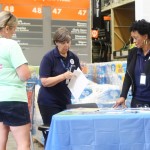ATLANTA – Georgia’s disaster survivors with disabilities may face challenges, but registering for federal assistance from Hurricane Matthew shouldn’t be one of them.
Storm survivors with disabilities can rest assured they will receive the same services and assistance offered to everyone in the declared disaster area. This is a FEMA commitment.
Federal assistance is available to eligible individuals and households in Bryan, Bulloch, Chatham, Effingham, Evans, Glynn, Liberty, Long, McIntosh and Wayne counties. Damage or losses from Hurricane Matthew must have occurred Oct. 4-15.
FEMA’s disaster recovery centers are locations where survivors can meet face-to-face with various agencies and service providers. The centers are equipped with accessibility kits that offer accommodations to meet the needs of the entire community, including people with disabilities. Survivors may visit any open recovery center but they do not need to visit a center to register.
Survivors can register the following ways:
-
Online at DisasterAssistance.gov.
-
Download the FEMA mobile app.
-
Call the FEMA Helpline at 800-621-3362 (FEMA). Persons who are deaf, hard of hearing or have a speech disability and use a TTY may call 800-462-7585. Toll-free numbers are open daily from 7 a.m. to 11 p.m.
In addition to accommodating survivors with disabilities, FEMA also reaches out to people with limited English proficiency by providing multilingual operators, making printed literature available in multiple languages and having translators available in the field. Information on the registration process is also available in American Sign Language at http://www.fema.gov/media-library/assets/videos/111546.
The U.S. Small Business Administration offers low-interest disaster loans for businesses of all sizes, homeowners, renters and private nonprofit organizations. For more information about SBA loans, call SBA’s disaster assistance customer service center at 800-659-2955, email disastercustomerservice@sba.gov or visit sba.gov/disaster. TTY users can call 800-877-8339. Applicants may also apply online using the electronic loan application via SBA’s secure website at disasterloan.sba.gov/ela.
For updates on Georgia’s Hurricane Matthew response and recovery, follow @GeorgiaEMA and @FEMARegion4 on Twitter and visit gemhsa.ga.gov and fema.gov/disaster/4284.
# # #
Follow this link:
Disaster Survivors with Disabilities Get the Same Assistance as Everyone Else



